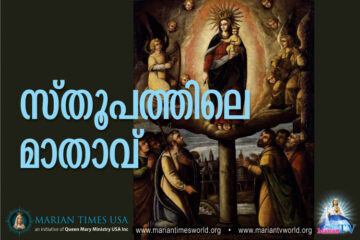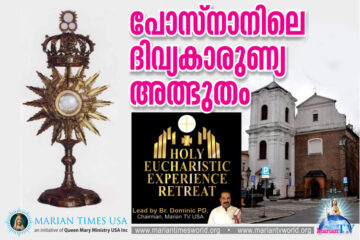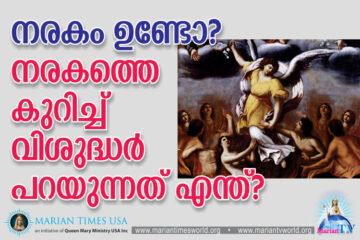JESUS HEALS THE MAN BORN BLIND (SUNDAY HOMILY)
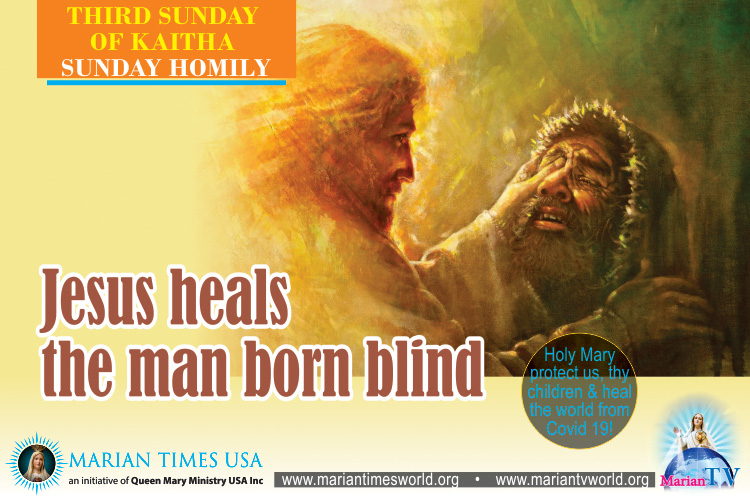
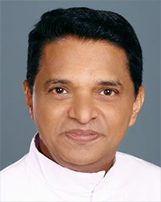
~ Fr. Abraham Mutholath, Chicago, USA. ~
HOMILY THIRD SUNDAY OF KAITHA
INTRODUCTION
Here is a chapter-long narration of an extra-ordinary miracle by Jesus. No one born blind was healed until that time. John the Evangelist presented this miracle to manifest the glory of Jesus. The miracle caused controversy among the Jews because Jesus performed it on a Sabbath. Because of the violation of Sabbath, the Pharisees considered Jesus as a sinner. Others asked how a sinner could perform such a miracle. When questioned, the parents of the blind man took a neutral position and did not defend Jesus. The blind man, besides gaining physical sight, also gradually gained spiritual vision. We are all born spiritually blind. Let us seek the help of Jesus, the Light of the World, to spiritually enlighten us and guide us to the eternal bliss.
The Bible Text
The Man Born Blind.
(1) As he passed by he saw a man blind from birth. (2) His disciples asked him, “Rabbi, who sinned, this man or his parents, that he was born blind?” (3) Jesus answered, “Neither he nor his parents sinned; it is so that the works of God might be made visible through him. (4) We have to do the works of the one who sent me while it is day. Night is coming when no one can work. (5) While I am in the world, I am the light of the world.” (6) When he had said this, he spat on the ground and made clay with the saliva, and smeared the clay on his eyes, (7) and said to him, “Go wash in the Pool of Siloam” (which means Sent). So he went and washed, and came back able to see. (8) His neighbors and those who had seen him earlier as a beggar said, “Isn’t this the one who used to sit and beg?” (9) Some said, “It is,” but others said, “No, he just looks like him.” He said, “I am.” (10) So they said to him, “[So] how were your eyes opened?” (11) He replied, “The man called Jesus made clay and anointed my eyes and told me, ‘Go to Siloam and wash.’ So I went there and washed and was able to see.” (12) And they said to him, “Where is he?” He said, “I don’t know.”
(13) They brought the one who was once blind to the Pharisees. (14) Now Jesus had made clay and opened his eyes on a sabbath. (15) So then the Pharisees also asked him how he was able to see. He said to them, “He put clay on my eyes, and I washed, and now I can see.” (16) So some of the Pharisees said, “This man is not from God, because he does not keep the sabbath.” [But] others said, “How can a sinful man do such signs?” And there was a division among them. (17) So they said to the blind man again, “What do you have to say about him, since he opened your eyes?” He said, “He is a prophet.” (18) Now the Jews did not believe that he had been blind and gained his sight until they summoned the parents of the one who had gained his sight. (19) They asked them, “Is this your son, who you say was born blind? How does he now see?” (20) His parents answered and said, “We know that this is our son and that he was born blind. (21) We do not know how he sees now, nor do we know who opened his eyes. Ask him, he is of age; he can speak for himself.” (22) His parents said this because they were afraid of the Jews, for the Jews had already agreed that if anyone acknowledged him as the Messiah, he would be expelled from the synagogue. (23) For this reason his parents said, “He is of age; question him.” (24) So a second time they called the man who had been blind and said to him, “Give God the praise! We know that this man is a sinner.” (25) He replied, “If he is a sinner, I do not know. One thing I do know is that I was blind and now I see.” (26) So they said to him, “What did he do to you? How did he open your eyes?” (27) He answered them, “I told you already and you did not listen. Why do you want to hear it again? Do you want to become his disciples, too?” (28) They ridiculed him and said, “You are that man’s disciple; we are disciples of Moses! (29) We know that God spoke to Moses, but we do not know where this one is from.” (30) The man answered and said to them, “This is what is so amazing, that you do not know where he is from, yet he opened my eyes. (31) We know that God does not listen to sinners, but if one is devout and does his will, he listens to him. (32) It is unheard of that anyone ever opened the eyes of a person born blind. (33) If this man were not from God, he would not be able to do anything.” (34) They answered and said to him, “You were born totally in sin, and are you trying to teach us?” Then they threw him out.
(35) When Jesus heard that they had thrown him out, he found him and said, “Do you believe in the Son of Man?” (36) He answered and said, “Who is he, sir, that I may believe in him?” (37) Jesus said to him, “You have seen him and the one speaking with you is he.” (38) He said, “I do believe, Lord,” and he worshiped him.
Interpretation
(1) As he passed by he saw a man blind from birth.
Jesus was coming out of the temple area. Because of the dispute with Jesus on Theological issues, the Jews had picked up stones to throw at Jesus. So, he left the temple area hiding himself from the public (John 8:59). That was the time when Jesus met the blind man begging for his living. Usually beggars gather at the temple premises seeking the almsgiving of worshippers. They used to wait at the gate of the Temple (Acts 3:2). Since the man was blind, he did not notice Jesus. Jesus saw him because, unlike others, Jesus had compassion to people who were suffering.
The specialty of this miracle was that, out of the six miracles for the blind recorded in the gospels, this is the only person who was born blind. Others were blind because of sickness or accident that had happened after their birth. This person had never seen light,nor seen any person, or anything in the world. He had no education and had not known about Jesus. No one had given sight to a person born totally blind. “It is unheard of that anyone ever opened the eyes of a person born blind.” (John 9: 32). Jesus opening the eyes of a blind person was a proof that he was the messiah to come. Isaiah had predicted: “when he comes, he will open the eyes of the blind and unplug the ears of the deaf.” (Isaiah 35:5).
(2) His disciples asked him, “Rabbi, who sinned, this man or his parents, that he was born blind?”
The disciples, who were accompanying Jesus, noticed that Jesus was paying empathetic attention to the blind. Along with the popular belief, they could see the blind only as a sinner who deserved no compassion. Traditionally sin was considered as the cause of sickness. This cause and effect was confirmed in the words of Jesus when he told the sick person whom he cured at the pool of Bethesda, “See, you are well again. Stop sinning or something worse may happen to you.” (John 5:14). Sickness could also happen as punishment for the sins of parents. “Do not bow down to any idol or worship it, because I am the LORD your God and I tolerate no rivals. I bring punishment on those who hate me and on their descendants down to the third and fourth generation.” (Exodus 20:5). Punishment for sins to generations is repeated in Exodus 34:7 and Number 14:18. That was the reason for the question of the disciples of Jesus when they saw this blind person from birth. They provided only two choices to choose from: his sin or the sins of his parents. Since he was born blind it could not be because of his sin. The probable answer they expected was that it was because of the sins of his parents or other ancestors.
(3) Jesus answered, “Neither he nor his parents sinned; it is so that the works of God might be made visible through him.
Jesus gave an unexpected answer to the disciples. Though sin and sickness came into the world because of the fall of first parents, Jesus considered that person’sblindness as a tool of God to manifest His glory. The Evangelist John gives importance to the glory of God manifested in the ministry of Jesus. The suffering of the innocent people who face severe sickness or calamities is well discussed and refuted in the Book of Job. Job was “a blameless and upright man who feared God and avoided evil” (Job 1:1) went through severe suffering. Because of his fidelity to God and patience, he regained his lost glory. The reverse message is that what a rich man inherits, or gains need not be because of his merits but because of the providence of God and God entrusts the resources to take care of the less fortunate.
(4) We have to do the works of the one who sent me while it is day. Night is coming when no one can work.
Jesus included his disciples by using “we” to do the works of God who sent Jesus. There was only limited time for them to do the work. Night was symbolic of losing the opportunity to work because of death or disability to work. We shall not lose every minuteto do good for the glory of God because there awaits a deadline when we must finish our work and give an account of the utilization of our time and resources.
(5) While I am in the world, I am the light of the world.”
God created the light on the first day of creation before He created the sun, moon, and stars on the fourth day. God has always been the source of spiritual light. Jesus who originated from the Father came down as the light of the world. Besides giving physical light to few blind, he gave spiritual light to many and continues to do the same. Jesus guides us who are spiritually blind to the true source of light.
(6) When he had said this, he spat on the ground and made clay with the saliva, and smeared the clay on his eyes,
Treatment with saliva and soilwere old medical practices because people believed in the curing effect of them. Jesus had used his saliva on other occasions also. When some people brought a deaf and mute man to Jesus, he spit and touched that man’s tongue (Mark 7:32-33). Jesus healed another blind man brought to him at Bethsaida by spitting on his eyes and placed His hands on him (Mark 8: 22-23).
Jesus had no need to use the spitted mud or washing in the lake for healing. However, he used some practice of the time to manifest the divine healing by human means.Though God can heal us supernaturally, we shall utilize the natural means of healing that God has provided. Using the clay reminds us how God created the first man using clay. The blind man experienced the compassion of Jesus by the healing touch of Jesus with the clay made of saliva.
(7) and said to him, “Go wash in the Pool of Siloam” (which means Sent). So he went and washed, and came back able to see.
Siloam means sent. Jesus, whom God sent to the world, sent the blind man to the pool of “Sent” to express his faith in the sender. We have a similar instance in the healing of Naaman by Prophet Elisha. Elisha asked Naaman to go to River Jordan and wash seven times to heal from his leprosy. That was a test of Naaman’s faith (2 Kings 5:10–14). Our cooperation and compliance with the commandments of the Lord are expected when we seek favors from God. Jesus had asked us to forgive others in order that we be forgiven by God.
Water was also considered as another agent for physical treatment. Water in the pool of Siloam was holy because it was carried in procession to the Temple and poured on the altar on the Feast of Tabernacles. The pool was also used to clean the sheep for sacrifices in the Temple. The blind man washed his uncleanliness in the water for gaining his vision that Jesus offered. When we were baptized we were also washed with water to take away our uncleanliness, so we could offer ourselves to God. The healed man returned to the place where Jesus met him probably looking for Jesus to express his gratitude. But Jesus had left the place.
(8) His neighbors and those who had seen him earlier as a beggar said, “Isn’t this the one who used to sit and beg?”
The former blind man’s neighbors and those who had seen him begging were raising the question. He was a well-known native of Jerusalem because many people had seen him begging in a sitting posture. Some of them were confused because they could not belive that this man who was blind from birth was looking normal and seeing normal.
(9) Some said, “It is,” but others said, “No, he just looks like him.” He said, “I am.”
People who were familiar with the formerly blind man expressed their normal reaction when they saw a great miracle happened to him. However, he confirmed his identity as the formerly blind beggar who got the healing. He was confirming the miracle happened to him.
(10) So they said to him, “[So] how were your eyes opened?”
Only the disciples of Jesus were present when Jesus smeared the eyes of the blind man with his saliva and clay. The public was curious to hear from the beggar how his eyes were opened. It was a great miracle and nothing like that had happened before.
(11) He replied, “The man called Jesus made clay and anointed my eyes and told me, ‘Go to Siloam and wash.’ So I went there and washed and was able to see.”
What the healed man knew about Jesus was his name and that he was a “man.” He did not see Jesus as a prophet or the messiah. Only later he realized step by step who Jesus was. He was physically and spiritually blind. He gave an orderly description of what happened. He did not see Jesus spitting on the soil and so he did not mention that. He said, Jesus made clay, anointed his eyes and asked him to go to Siloam and wash. Then he did as Jesus asked him to do and got the sight.
(12) And they said to him, “Where is he?” He said, “I don’t know.”
The healed man did not get a chance to see Jesus. By the time he got sight and returned, Jesus was gone from there. So, he was not aware of where Jesus was.
(13) They brought the one who was once blind to the Pharisees. (14) Now Jesus had made clay and opened his eyes on a sabbath.
The Jews in Jerusalem knew that their conservative leaders, especially Pharisees hated Jesus because he was not strictly following the Jewish observance of Sabbath. Since Jesus healed the blind man on a Sabbath, they wanted confirmation from the Pharisees to keep the blind man as member of the Sanhedrin. Everyone who accepted Jesus, was expelled from the Synagogue. The people and their leaders were not generous to acknowledge the glory of God happened through Jesus for the blind beggar. Instead, they made use of it to plot against Jesus.
Though spitting on the ground, making clay out of it, rubbing it on the eyes, and asking the blind man to walk long distance were simple acts to us, they were considered violation of sabbath observance during the public ministry of Jesus. For Jesus, these were acts of mercy that fulfilled the worship on the sabbath. They were not against the spirit of Mosaic law but against the rules the leaders laid out later with wrong assumptions. From the Pharisees’ point of view, what Jesus did could be done on another day. As per Rabbinic rules, acts of recovery could be done on the Sabbath only in case of an imminent danger.
(15) So then the Pharisees also asked him how he was able to see. He said to them, “He put clay on my eyes, and I washed, and now I can see.”
The Pharisees started their investigation. To their question, the formerly blind man answered a summarized version of what he had told his neighbors and acquaintances. The brief answer was an expression of his displeasure in the interrogation. He smelled that the Pharisees were not appreciating the grace he received but trying to find fault with his benefactor. So, he skipped the details to avoid more accusations against Jesus. He did not mention the name of Jesus, how he made clay, and sent him to the pool of Siloam. Thus, he was a favorable witness of Jesus.
(16) So some of the Pharisees said, “This man is not from God, because he does not keep the sabbath.” [But] others said, “How can a sinful man do such signs?” And there was a division among them.
One group of the Pharisees could not appreciate the miraculous healing by Jesus or what the former blind beggar received. From a negative perspective, they could see Jesus as a violator of the sabbath observance. The other group had a logical question: How could a sinful man do such an unheard miracle? Their guess could be positive or negative. In the positive sense, they could mean that Jesus must be from God to perform such a sign and hence he could not be a sinner. Some members of the Sanhedrin like Nicodemus and Joseph of Arimathea had such a view. In the negative sense, as a sinful person, Jesus was performing miracles with the help of Beelzebul, the prince of the demons. (Matthew 12:24).
(17) So they said to the blind man again, “What do you have to say about him, since he opened your eyes?” He said, “He is a prophet.”
Since the Pharisees could not agree on who Jesus was, they asked the opinion of the formerly blind man on what he thought of Jesus because he was the one who experienced the miracle. A positive response on Jesus could cause him trouble from the Pharisees like expulsion from synagogue. That, in fact, happened later. However, unlike the previous occasion when he qualified Jesus as a “man,” this time he presented Jesus, whom he never met but experienced, as “a prophet.” A prophet meant a messenger from God. Thus, the blind man who regained his sight through Jesus, began to gain also spiritual sight.
(18) Now the Jews did not believe that he had been blind and gained his sight until they summoned the parents of the one who had gained his sight.
The Pharisees wanted to prove that the miracle was a made-up story for the popularity of Jesus. If such a miracle was real, they would have to acknowledge the divine power of Jesus who they hated and wanted to avoid. So, they summoned the parents of the formerly blind man. Those who are negative will always look for loopholes to prove their views.
(19) They asked them, “Is this your son, who you say was born blind? How does he now see?”
The Jews needed two witnesses for belief. The parents of the healed man would be the best witnesses because they knew him from birth. Three questions were asked to the parents: (1) Was he their son? (2) Was he born blind? (3) How did he get the sight? The second question, “who you say was born blind” implied that they did not believe he was born blind. If he was born with eyesight and became blind later, that would lessen the quality of the miracle and the credibility of the claim made in favor of Jesus.
(20) His parents answered and said, “We know that this is our son and that he was born blind.
They could easily give positive answers for the first two of the three questions. They assured the Jews that the formerly blind man was their son and that he was born blind.
(21) We do not know how he sees now, nor do we know who opened his eyes. Ask him, he is of age; he can speak for himself.” (22) His parents said this because they were afraid of the Jews, for the Jews had already agreed that if anyone acknowledged him as the Messiah, he would be expelled from the synagogue. (23) For this reason his parents said, “He is of age; question him.”
The parents might know the truth from their son that Jesus had healed him. They were not eyewitnesses to the miracle and they knew the bad intention of the Jews. So, they did not want to give a true answer to the third question because they might have been afraid of expulsion from the synagogue. The decision of expulsion from the synagogue must have been a local one and was not a formal order from the Sanhedrin because the disciples of Jesus continued to be members of the synagogue for many more years until 85 A.D. The parents requested the Jews to seek the answer of their adult son who knew how he was healed and the person who did the miracle for him. The parents took a neutral stand to save themselves from the anger of Jews upon them.
(24) So a second time they called the man who had been blind and said to him, “Give God the praise! We know that this man is a sinner.”
The Pharisees who questioned the parents were not satisfied with their answer. Since the formerly blind was not present when they questioned the parents, they called him. Since the Pharisees did not belive in the cure, they morally forced him to tell that he had lied. They tried to convince him that Jesus was a sinner from their knowledge and that he should tell the truth on his healing. “Give God the praise” is a confession formula insisting the guilty to convey the truth. When Joshua questioned Achan on his mistake, Joshua said, “’My son, give glory to the LORD, the God of Israel, and praise him by telling me what you have done; do not hide it from me.’ Achan answered Joshua, ‘I have indeed sinned against the LORD, the God of Israel’”. (Joshua 7:19-20). The Pharisees were expecting a similar confession from the cured blind beggar.
(25) He replied, “If he is a sinner, I do not know. One thing I do know is that I was blind and now I see.”
The former blind man asserted that he was blind, Jesus healed him, and afterwards he could see. So according to the logic of Pharisees, Jesus could not be a sinner because a sinner could not do such a miracle. So, without any argument the blind man ironically presented his view that Jesus was not a sinner. Out of his experience, he could not agree with the Pharisees. Even at the risk of expulsion from the synagogue, he affirmed his faith in Jesus.
(26) So they said to him, “What did he do to you? How did he open your eyes?”
The Pharisees repeated the question on how Jesus opened the eyes of the blind man. Their intention might have been to prove their negative stand on Jesus and to find inconsistency in the answers of the illiterate blind man. They also wanted to find fault with Jesus based on his prohibited actions on the Sabbath.
(27) He answered them, “I told you already and you did not listen. Why do you want to hear it again? Do you want to become his disciples, too?”
The former blind man did not repeat his answer. Instead, he was bold to question the Pharisees who were of high status among the Jews. His answer was that he had already told them, and theydid not heed to it. He understood their bad intention of finding fault with Jesus instead of appreciating him. So, he raised sarcastic questions against the Pharisees. He already knew that Jesus had disciples because he heard them asking question to Jesus on the cause of his blindness.
(28) They ridiculed him and said, “You are that man’s disciple; we are disciples of Moses!
Because of the ironic questioning and non-cooperation of the former blind beggar, the Pharisees were offended and so they ridiculed him. They even credited him to be a disciple of Jesus when he was not. He had developed appreciation towards Jesus and thought that he must be a prophet. The Pharisees then contrasted them with Moses. While the blind man was becoming the disciple of Jesus, the Pharisees remained to be disciples of Moses. Moses was the servant of God, whereas Jesus was the Son of God. A true believer of Moses should become a follower of Jesus because Moses also had written and testified of Christ.
(29) We know that God spoke to Moses, but we do not know where this one is from.”
Pharisees knew that God had spoken to Moses on several occasions, especially on Mount Sinai. However, Moses had not seen God face to face in full glory. God told Moses, “you cannot see my face, for no one may see me and live.” (Exodus 33:20). The Pharisees were not open to God and could not understand that Jesus was from God and that he was the God incarnate.
(30) The man answered and said to them, “This is what is so amazing, that you do not know where he is from, yet he opened my eyes.
The formerly blind man could not comprehend the argument of the Pharisees against his personal experience of miraculous healing by Jesus. He was sure that Jesus opened his eyes though he did not know whether Jesus was a sinner or a divine messenger like Moses.
(31) We know that God does not listen to sinners, but if one is devout and does his will, he listens to him.
The blind beggar who experienced mercy and unheard miracle from Jesus told the Pharisees defending Jesus. His faith began to increase. Using the argument of Pharisees, he affirmed that Jesus could not be a sinner. God listened to Jesus to perform the miracle because Jesus was devout and was doing the will of God.
(32) It is unheard of that anyone ever opened the eyes of a person born blind. (33) If this man were not from God, he would not be able to do anything.”
The only healing from blindness in the Old Testament was that of Tobit. However, he was not born blind. That made the miracle of Jesus so important and became a proof for his messiahship. Unlike the Pharisees who were well educated in religion, this illiterate man argued that Jesus could not do such miracles unless he was from God.This also shows how the argument with the Pharisees led the cured man to increase his faith in Jesus. This was a fulfillment of what Jesus declared in Luke 10:21, “I praise You, Father, Lord of heaven and earth, because You have hidden these things from the wise and learned and revealed them to little children.” This childlike and illiterate person knew more about God than the religiously learned Pharisees.
(34) They answered and said to him, “You were born totally in sin, and are you trying to teach us?” Then they threw him out.
The Pharisees were offended by the reasonable questions and prudent answers of the illiterate beggar. According to them he was cursed by God even before his birth. He was born in sin in the sense that God had punished him with blindness even from the time of his birth. As the disciples had asked earlier, either he or his parents might have sinned. How could a sinner and beggar who was hated by all could teach the Pharisees? So, they punished him by expelling him from the community.
(35) When Jesus heard that they had thrown him out, he found him and said, “Do you believe in the Son of Man?”
Jesus came in search of the man when he found that the Pharisees had expelled him because of his profession of faith in Jesus. His parents had forsaken him for fear of Jews. However, Jesus came to his rescue fulfilling Psalms 27:10, “Even if my father and mother abandon me, the LORD will hold me close.” Jesus gave him another opportunity to declare his faith in the “Son of Man.” Instead of using “Son of God” for himself, Jesus often humbly used “Son of Man” as a human being and as an exalted heavenly one as given in Daniel 7.
(36) He answered and said, “Who is he, sir, that I may believe in him?”
Though Jesus had spoken and touched the blind man’s eyes with spitted soil before, he was seeing Jesus with his eyes only when Jesus returned in search of him. So, he could not understand who was the “Son of Man.” He was curious to understand who that Son of Man was who healed him.
(37) Jesus said to him, “You have seen him and the one speaking with you is he.”
This answer of Jesus identifying himself and the expected “Son of Man” was like how Jesus introduced himself to the Samaritan woman in John 4:26, “I who speak to you am he.” Thus, Jesus revealed to this poor man who he was.
(38) He said, “I do believe, Lord,” and he worshiped him.
The climax of the long event is the profession of faith of this formerly blind beggar and his worship of Jesus as an act of his faith. Like St. Peter and St. Thomas, this poor man got the opportunity to publicly profess his faith. Like many others, he prostrated and worshipped Jesus. Worship means veneration paid to a divine being. Jesus allowed others to worship him to acknowledge his divinity though he never sought for it. Several earthly kings had demanded worship considering themselves as deities. This man voluntarily worshipped Jesus humbling himself, expressing his love and gratitude to Jesus. Thus, the blind man’s belief in Jesus started with “a man” later turned into a prophet and finally as Lord or Son of God.
Message
- We normally do not appreciate our gift of sight. God has given us eyes to see the glory of God and to worship him through our service to others. Often, we misuse our eye sight for sins. Then our eye sight leads us to spiritual blindness.
- There could be sickness or disability because of one’s own sin or the carelessness of others like drunkenness, smoking, crazy driving, sexual misconduct, and irresponsible behavior. However, every sickness or accident need not have a relation with the sin of the person involved. So, we cannot judge others. Instead, we need to be compassionate and helping those in need even if it happened because of their fault.
- The opposition of religious leaders against Jesus led to the spiritual growth of the blind man. Negativities of others can also cause good results in us.
- The parents of the blind man who got the healing were not willing to acknowledge that it was Jesus who healed their son. They found excuses that they were not eyewitnesses and their son was of age to answer the question. We also sometimes take such neutral position to save ourselves from challenges in acknowledging the favors of God.
- When we have disabilities, diseases, or other mishaps in life, we should not take such sufferings in a negative sense. God has a plan for each of us and our hardships might lead to the glory of God and betterment of us in due time as it happened in the case of Job and the blind man in this parable.
- Jesus came in search of the formerly blind man whom the Jews expelled from the community and the parents abandoned for fear of the Jewish leaders. Jesus offered him support and gave him more spiritual sight. Let us be aware that when we stand for Jesus and face challenges on our faith, Jesus will be our defender.
- The blind man got double healing: Physical eye sight and a spiritual insight that led him to the eternal light through Jesus the Light of the World. Though many in the world have physical sight they lack spiritual vision. Let us seek more the spiritual sight for ourselves, and others who need our assistance.
മരിയന് ടൈംസിലെ ഇന്നത്തെ പ്രധാനപ്പെട്ട അപ്ഡേറ്റുകള് താഴെ ലഭിക്കുന്നതാണ്.



